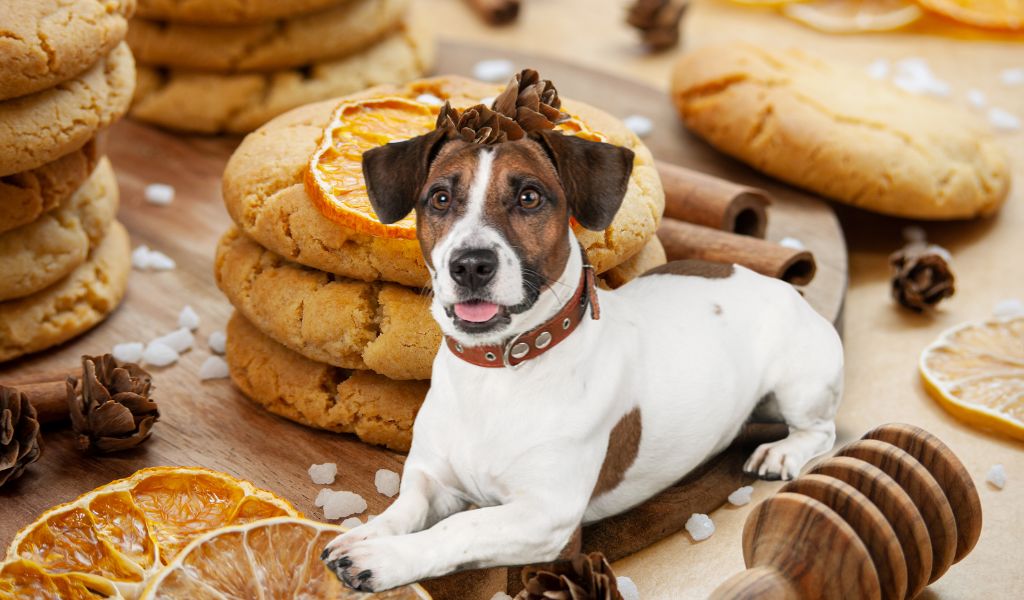Many dog owners have wondered about the safety of giving their dog ginger biscuits.
After all, if humans can enjoy them, why shouldn’t our pets?
However, before you give your dog a ginger biscuit, it’s important to understand the potential risks associated with this snack.
Ginger biscuits contain high amounts of sugar making them unsuitable for dogs. The sugar content can cause digestive disturbances in some dogs, leading to an upset stomach or diarrhea. Additionally, if a dog consumes too many ginger biscuits they may suffer from weight gain and have difficulty controlling their blood sugar levels.
The benefits of ginger for dogs
Ginger is actually quite beneficial for dogs when given in moderation.
It has anti-inflammatory and antioxidant properties that can help reduce joint pain and improve digestion.
Furthermore, many dog owners believe that ginger can potentially help with motion sickness and nausea.
However, too much ginger can be dangerous for a dog as it may cause digestive issues like an upset stomach or diarrhea.
To ensure your dog doesn’t consume too much at once, keep in mind that the recommended dose is no more than one teaspoon per day for small dogs and no more than two teaspoons per day for larger breeds.

The ingredients in biscuits are often unsuited to dogs
In addition to the sugar content, ginger biscuits also contain other ingredients that may not be suitable for dogs.
Most ginger biscuit recipes contain butter, which is high in fat and can cause an upset stomach.
Additionally, many biscuit mixes contain nuts and other ingredients that are not easily digestible for dogs.
They can often contain artificial additives, such as preservatives and flavourings which, although suitable for humans, can cause digestive and other problems for dogs.
Ginger biscuits are not recommended
The bottom line is that, although ginger can have some benefits for dogs, the source of this should not be ginger biscuits.
Biscuits are best kept for humans due to their sugary content, unsuitable ingredients and risk of digestive problems.
Rather than feeding your dog ginger biscuits, try giving them a small amount of fresh or dried ginger instead.
This way you can ensure that your pet gets the benefits without any of the unhealthy side effects.
If in doubt, always speak to your vet for advice before introducing a new food into your dog’s diet.
THE RISKS OF FEEDING GINGER BISCUITS TO DOGS
Feeding ginger biscuits to dogs can pose several risks, even though ginger itself is not toxic to them.
Here’s a breakdown of the potential hazards:
Sugar Content:
Obesity and Dental Issues: Biscuits, especially those meant for humans, often contain high levels of sugar, which can contribute to obesity and dental problems in dogs.
Artificial Sweeteners:
Xylitol Toxicity: Some biscuits might contain xylitol, an artificial sweetener that is extremely toxic to dogs, leading to rapid insulin release, hypoglycaemia, liver failure, and even death.
High Fat Content:
Pancreatitis: Biscuits can also be high in fat, which may lead to pancreatitis in dogs, especially if they consume a large amount or have a predisposition to this condition.
Spices and Additives:
Gastrointestinal Upset: Some spices and additives in ginger biscuits can cause gastrointestinal upset in dogs, including vomiting and diarrhoea.
Allergic Reactions: Some dogs might be allergic to ingredients found in biscuits, such as wheat or certain spices.
Choking Hazard:
Physical Risk: Depending on the size and shape of the biscuits, they might pose a choking hazard, especially for smaller dogs.
Behavioural Issues:
Begging and Aggression: Regularly feeding human food to dogs can encourage begging behaviours and potentially food aggression.
Nutritional Imbalance:
Inadequate Diet: Dogs have specific dietary requirements, and regular consumption of human foods like biscuits can lead to nutritional imbalances.
FAQs
Can dogs eat ginger biscuits?
Yes, dogs can eat ginger biscuits in moderation, as long as they are free from harmful ingredients such as xylitol, chocolate, or excessive sugar.
Are ginger biscuits a good choice for dogs?
No. They contain sugar and other ingredients that really are not suited to the canine diet. If you want to treat your dog then avoid human biscuits and get him some dog treats.
How much ginger biscuit can a dog eat?
The amount varies depending on your dog’s size, but generally, one or two small ginger biscuits as a treat should be safe for most dogs. Always consult with a vet to be sure.
Is ginger beneficial for dogs?
Ginger has anti-inflammatory properties and can aid digestion, help with nausea and motion sickness in dogs. However, it should be given in moderation and always under a vet’s guidance.
What should I do if my dog accidentally eats too many ginger biscuits?
If your dog eats too many ginger biscuits, monitor for symptoms like diarrhea, vomiting, or restlessness. If these or other concerning symptoms appear, contact your vet immediately.
Are there alternatives to ginger biscuits for dogs?
Yes, there are many dog-friendly treats available that provide similar benefits without the potential sugar content of ginger biscuits. Consider options like carrots, apples, or dog-specific dental treats.
Final Words
We all like to treat our dogs from time to time and there are many good sources of dog treats.
Human foods such as biscuits, that contain high levels of sugar, are not recommended and have the potential to do more harm than good.
Fresh or dried ginger is a safer alternative to treats such as ginger biscuits, but should still be given in moderation.




